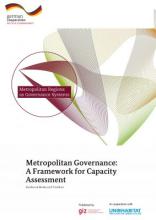Land Library
Welcome to the Land Portal Library. Explore our vast collection of open-access resources (over 74,000) including reports, journal articles, research papers, peer-reviewed publications, legal documents, videos and much more.
/ library resources
Showing items 46 through 54 of 149.UN-Habitat and GIZ have developed the Metropolitan Capacity Assessment Methodology (MetroCAM) as a joint contribution to implement urban sustainable development agendas and bring them to the metropolitan scale. It complements the Unpacking Metropolitan Governance series.
This chapter accomplishes several purposes, in which it shares the reader the theoretical orientation and empirical evidences of numerous studies that are closely related to the issues being raised in this study.
The majority of rural Rwandans are dependent on land for their livelihoods. Recognizing the critical nature of land to peace, stability, and economic development, Rwanda began implementing the Land Tenure Regularisation Process (LTRP) in 2008.
Since mid-1970s, a great number of rural-urban migrants are converging towards Kigali, the capital of Rwanda, and secondary towns, putting strain on land, especially of urban fringes.
We present a report on the results of a 10-month pilot project conducted in North- Western Rwanda that aimed to explore fruitful ways to engage with customary law in order to empower rural communities and rural women in particular.
The world today faces a wide range of critically important issues, whose resolution require inter- national collaboration of various stakeholders. Environmental conservation and conflict resolution are such examples.
This Policy & Practice Brief analyses the role of traditional institutions for conflict resolution, paying special attention to their relevance in post-conflict societies.
Ministerial Order N° 009/16.1 of 23/8/2011 Determining the Procedure to Obtain Freehold Land Title. Published on the 5 September 2011.
RCN Justice & Démocratie monitored the activities of the Mediation Committees (Komite y’Abunzi) in Rwanda for eighteen months from 2009 to 2011 and presents in this report its main findings and analysis.







